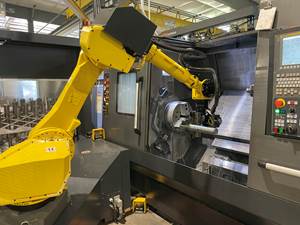Manufacturing Skills Standards
It had been a long day, and John, human resources manager at ZTB Company, had reviewed about 100 applications. Only a handful of them were what he would consider candidates for an interview.
Share





It had been a long day, and John, human resources manager at ZTB Company, had reviewed about 100 applications. Only a handful of them were what he would consider candidates for an interview. Of those, he would probably only talk with one or two candidates, and even then, he would probably go right back to the in-box. Yet another day has gone by, and positions at his company have gone unfilled.
Susan, a junior at the Anywhere Senior High School was having a typical day—classes, volleyball practice after school, then off to her job at the coffee shop. Sitting in her trigonometry class, she wonders, "What's this all for? Why should I be excited to learn this stuff? I have more important things to take care of after school."
Jack, Susan's father, who works at a local semi-conductor plant, tries to convey to Susan how important school is and that she needs to stay focused. But he also faces his own educational challenges—in his quest to upgrade his skills, he is having a hard time pinpointing exactly what training he needs to advance his career.
These are hypothetical situations, but these are the type of things that are happening in America's companies, schools and homes. Companies are spending large sums of money looking for the right people. Students are doing what they always do, but not always with clear direction. And workers want to upgrade their skills, but don't know the most efficient way to do so.
A solution to these challenges is becoming a reality as a result of the work of the Manufacturing Skill Standards Council (MSSC). The MSSC—an industry-led coalition of business, education and training providers; unions; and community-based organizations—is steadily making progress in developing tools that will help the Johns, Susans and Jacks make decisions that are right for them. The MSSC began work in 1998 to start developing a Skill Standards System for manufacturing. The MSSC Skill Standards System is comprised of skill standards at the core, concentration and specialty levels as well as assessments and certifications to those standards.
Recently, the MSSC, in cooperation with more than 800 manufacturing companies and more than 4,000 workers, finished the final development of the skill standards at the core and concentration level. This includes the research and national validation of the specific job functions in high performance work sites—the indicators that tell when the job is completed successfully, as well as the level of technical knowledge and skills needed for the job. To get to the specialty level, the MSSC will work with "specialty groups," many of which have already developed their own standards (for example, metalworking, welding, chemicals and electronics) to see how their standards and the MSSC's fit together to provide a common pathway to that set of skills.
Under the guidance of the National Skill Standards Board (NSSB), this is the first time in our nation's history that skill standards will have been developed under a common format and language for all sectors of manufacturing. Skill standards can have many uses—for hiring, to pinpoint training needs, for career pathways and more. The standards, when combined with the related assessment and certification tools that the MSSC is also developing, will represent a major national initiative to elevate both the skills and flexibility of the American workforce. The MSSC system will help improve manufacturers' productivity and global competitiveness.
The MSSC expects to have the skill standards ready for public review and comment by the end of the year. From there, the MSSC will work toward the completed skill standards by Spring 2001. You can learn more by visiting the MSSC Web site at .
Related Content
How I Made It: Nushrat Ahmed: CNC Swiss Operator
By day, 21-year-old Nushrat Ahmed is a CNC Swiss operator making automotive parts. By night, she handcrafts crocheted items.
Read MoreFinding the Right Tools for a Turning Shop
Xcelicut is a startup shop that has grown thanks to the right machines, cutting tools, grants and other resources.
Read MoreWorkholding Fixtures Save Over 4,500 Hours of Labor Annually
All World Machinery Supply designs each fixture to minimize the number of operations, resulting in reduced handling and idle spindle time.
Read MoreSame Headcount, Double the Sales: Successful Job Shop Automation
Doubling sales requires more than just robots. Pro Products’ staff works in tandem with robots, performing inspection and other value-added activities.
Read MoreRead Next
AMRs Are Moving Into Manufacturing: 4 Considerations for Implementation
AMRs can provide a flexible, easy-to-use automation platform so long as manufacturers choose a suitable task and prepare their facilities.
Read MoreMachine Shop MBA
Making Chips and 91ÊÓƵÍøÕ¾ÎÛ are teaming up for a new podcast series called Machine Shop MBA—designed to help manufacturers measure their success against the industry’s best. Through the lens of the Top Shops benchmarking program, the series explores the KPIs that set high-performing shops apart, from machine utilization and first-pass yield to employee engagement and revenue per employee.
Read More

















